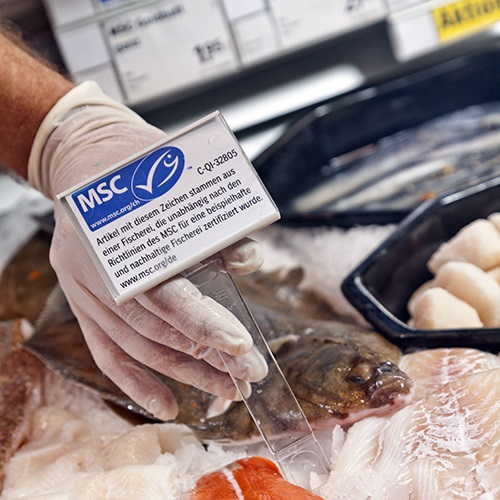You can trust that seafood with the blue MSC label was caught by a responsible fishery in a sustainable way that ensures healthy oceans and safeguards seafood supplies for the future. This assurance is provided through independent assessment of fisheries to the MSC Fisheries Standard and supported by full traceable supply chains with Chain of Custody Certification.
Science based standards
To be sold with the MSC blue fish label, seafood must come from a fishery certified to the MSC Fisheries Standard.
This Standard was developed in consultation with a wide range of experts including scientists, the fishing industry, conservation groups, and others. It is reviewed every five years to ensure that it continues to reflect international best practice in fisheries management and science.
It is based on three core principles:
- Sustainable fish stocks. There are enough fish are left in the sea to reproduce so fishing can continue indefinitely.
- Minimal environmental impact. Fishing operations must be carefully managed to maintain the structure, productivity, function diversity of the marine ecosystem.
- Effective management. The fishery must comply with relevant laws and have a management system that allows it to respond quickly to changes in the status quo.
Twenty-eight performance indicators make up these three core principles and are used by independent accreditation bodies to score the fishery. Certified fisheries are audited annually over the five-year period of the certificate.
““The MSC has shown over twenty years that its approach can make a significant contribution to ocean conservation.””
WWF International
Sustainable Seas: what is the MSC Fisheries Standard and how does it ensure healthy oceans
Third party assessment
Assessment
The MSC does not assess fisheries. This is the job of a third party independent assessment team made up of experts in fisheries management. They consult everyone with an interest in the fishery – from retailers to NGOs to governing bodies. This ensures that all information is considered and that outcomes are based on evidence. All evidence, decisions, and reports are published on fisheries.msc.org.
Once certified, fisheries are audited annually to ensure that they are maintaining the required level of sustainability and meeting any conditions of MSC certification.
Traceable supply chains

Anyone selling MSC certified seafood must follow strict rules to ensure that it is kept separate from other fish and is clearly labeled at all times. We carry out DNA testing and unannounced tracebacks to verify the system works.
Don’t just take our word for it
The MSC is the only international seafood labeling program to be recognized by the Global Sustainable Seafood Initiative (GSSI) which confirms that we meet the UN FAO guidelines.
The MSC is also a member of ISEAL, the International Social and Environmental Accreditation and Labelling Alliance, which requires compliance with their highly regarded Codes for Standard-Setting, Assurance and Impact Monitoring.
Organisations such as WWF recommend consumers look for the MSC blue fish on seafood.
Find out more about how we meet best practice on our main website, msc.org
Independent studies
Reports and guides
- ThisFish Eco-Rating Guide
- Dutch Independent Institute Mileu Centraal, comparison of 90 ecolabels in the Netherlands (2016)
- WWF Report: Comparison of Wild Capture Fisheries Certification Schemes (Accenture Development Partnerships, 2012)
Academic papers
- Estimating the economic benefits of MSC certification for the South African hake trawl fishery (Lallemand et al, 2016)
- From certification to recertification the benefits and challenges of the Marine Stewardship Council (MSC): A case study using lobsters (Bellchambers et al, 2015)
- Authority without credibility? Competition and conflict between ecolabels in tuna fisheries (Miller & Bush, 2015)
- An Evaluation of Environmental Changes Within Fisheries Involved in the Marine Stewardship Council Certification Scheme (Martin et al, 2012)
- Eco-label conveys reliable information on fish stock health to seafood consumers (Gutierrez et al, 2012)
Want to know more?

What is the MSC Chain of Custody?
Get the details on MSC Chain of Custody Standard and find out which version makes sense for your company.

What is the certification process like?
Learn more about the steps involved in getting your supply chain MSC certified.

Are consumers demanding sustainable seafood?
Shoppers are “voting with their forks” for healthy oceans.

